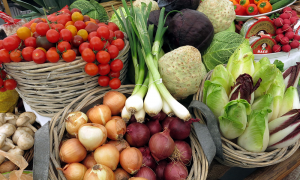The Benefits of Becoming Vegan
 College of DuPage Nursing Student Jessica DeAquino researched for Healthy Lombard that as today’s youth become increasingly aware of the importance of nutrition and its impact on the environment, veganism has become very popular. But whether veganism is a scam has recently arisen. The availability of natural food items is often limited for those in lower socioeconomic classes due to higher costs associated vegan foods, making veganism seemingly unnecessary. It is therefore, pertinent to ask if veganism is just another fad diet for the newer generations?
College of DuPage Nursing Student Jessica DeAquino researched for Healthy Lombard that as today’s youth become increasingly aware of the importance of nutrition and its impact on the environment, veganism has become very popular. But whether veganism is a scam has recently arisen. The availability of natural food items is often limited for those in lower socioeconomic classes due to higher costs associated vegan foods, making veganism seemingly unnecessary. It is therefore, pertinent to ask if veganism is just another fad diet for the newer generations?
The benefits of becoming a vegan.
A well-planned, vegan diet that relies solely on plant-based products can actually provide adequate nutrition. Vegan diets provide enough nutrients to meet dietary requirements of grains, vegetables, fruits, nuts and seeds, legumes and dried fruits. As vegan diets have increased in popularity, they have been proven effective to lower cholesterol and blood pressure. A recent study by Alexander et al., (2017) demonstrated that vegans had significant lower systolic and diastolic pressures. The researchers included 26 participants who were receiving medical treatment for high blood pressure and were placed on a vegan diet for 1 year. At the end of the study period, the blood pressure was lower in 20 of subjects, and they were able to discontinue their medications for blood pressure. They (Alexander et al., 2017) also found veganism improved self-control, specifically by helping individuals to remain determined and focused.
Good for you and good for the environment too.
Moreover, according to, Global Citizen, becoming vegan can save the environment. By opting for veganism, the safety of the environment is enhanced; air pollution is reduced since raising livestock produces air pollution whereas plants clean the air.
The disadvantages of becoming a vegan.
Veganism is an beneficial change, but it also has disadvantages such as, a risk for certain vitamin deficiencies, such as Vitamin B12 which is crucial for expecting mothers. It is more difficult to dine out and the cost may not be affordable for those in lower socioeconomic classes. Besides difficult with dining out, purchasing organic, plant based products is expensive, and the high price of healthy foods is considered a contributing factor to obesity compared to cheaper, less healthy food options.
To Vegan or not to Vegan.
If you are considering veganism, it is a good idea to consult with a healthcare professional before changing your diet. Depending on the status of underlying health, dietary changes may require medical approval. As previously discussed, becoming vegan may come with minor disadvantages, however, the benefits to health and the environment outweigh these disadvantages making veganism a healthy lifestyle choice rather than a scam.
References
Alexander, S., Ostfeld, R., Allen, K., & Williams, K. (2017, May). A plant-based diet and hypertension. Retrieved November 10, 2020,
https://www.ncbi.nlm.nih.gov/pmc/articles/PMC5466938/
Baroni, L., Goggi, S., Battaglino, R., Berveglieri, M., Fasan, I., Filippin, D., Griffith, P., Rizzo, G., Tomasini, C., Tosatti, M. A., & Battino, M. A. (2018). Vegan Nutrition for Mothers and Children: Practical Tools for Healthcare Providers. Nutrients, 11(1), 5. https://doi.org/10.3390/nu11010005
Bhide, M. (2011, February 14). 9 Pros and Cons to Going Vegan – will this strict diet work for you -. Retrieved October 30, 2020, from https://www.aarp.org/food/diet nutrition/info-02-2011/9-pros-and-cons-to-going-vegan.html

Leave a Reply
Want to join the discussion?Feel free to contribute!